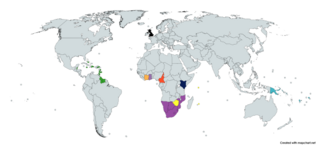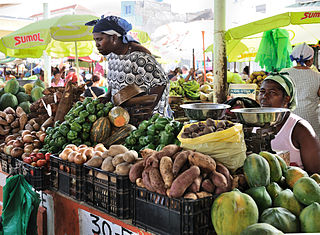
The economy of Jamaica is heavily reliant on services, accounting for 71% of the country's GDP. Jamaica has natural resources and a climate conducive to agriculture and tourism. The discovery of bauxite in the 1940s and the subsequent establishment of the bauxite-alumina industry shifted Jamaica's economy from sugar, and bananas.

The Marshall Islands, officially the Republic of the Marshall Islands, is an island country west of the International Date Line and north of the equator in the Micronesia region in the Northwestern Pacific Ocean.

UN Trade and Development (UNCTAD) is an intergovernmental organization within the United Nations Secretariat that promotes the interests of developing countries in world trade. It was established in 1964 by the United Nations General Assembly (UNGA) as the United Nations Conference on Trade and Development but rebranded to its current name on the occasion of its 60th anniversary in 2024. It reports to both the General Assembly and the United Nations Economic and Social Council (ECOSOC). UNCTAD is composed of 195 member states and works with non-governmental organizations worldwide; its permanent secretariat is at UNOG in Geneva, Switzerland.

The government of the Marshall Islands is the largest employer, employing 30.6% of the work force, down by 3.4% since 1988. GDP is derived mainly from payments made by the United States under the terms of the amended Compact of Free Association. Direct U.S. aid accounted for 60% of the Marshall Islands' $90 million budget.
In economics, the Leontief's paradox is that a country with a higher capital per worker has a lower capital/labor ratio in exports than in imports.

Economic Partnership Agreements (EPAs) are a scheme to create a free trade area (FTA) between the European Union and other countries. They are a response to continuing criticism that the non-reciprocal and discriminating preferential trade agreements offered by the EU are incompatible with WTO rules. The EPAs date back to the signing of the Cotonou Agreement. The EPAs with the different regions are at different states of play. The EU has signed EPAs with the following countries: the Southern African Development Community (SADC), ECOWAS, six countries in Eastern and Southern Africa, Cameroon, four Pacific states, and the CARIFORUM states. Their defining characteristic is that they open up exports to the EU immediately, while exports to the partner regions is opened up only partially and over transitioning periods.

The economy of Cape Verde is a service-oriented economy that is focused on commerce, trade, transport and public services. Cape Verde is a small archipelagic nation that lacks resources and has experienced severe droughts. Agriculture is made difficult by lack of rain and is restricted to only four islands for most of the year. Cape Verde's economy has been steadily growing since the late 1990s, and it is now officially considered a country of average development, being only the second African country to have achieved such transition, after Botswana in 1994. Cape Verde has significant cooperation with Portugal at every level of the economy, which has led it to link its currency first to the Portuguese escudo and, in 1999, to the euro.

Singapore–United Kingdom relations, also referred to as British–Singaporean relations, refers to the bilateral relations between the Republic of Singapore and the United Kingdom of Great Britain and Northern Ireland. Both countries are full members of the Commonwealth of Nations and are marked by historical, cultural, institutional and language ties, extensive people-to-people links, aligned security interests, sporting tournaments, and significant trade and investment co-operation.

India–Marshall Islands relations are the bilateral relations between India and the Marshall Islands. The respective embassies of the two countries in Tokyo, Japan are concurrently accredited to each other. Marshall Islands maintains an Honorary Consulate in New Delhi.







